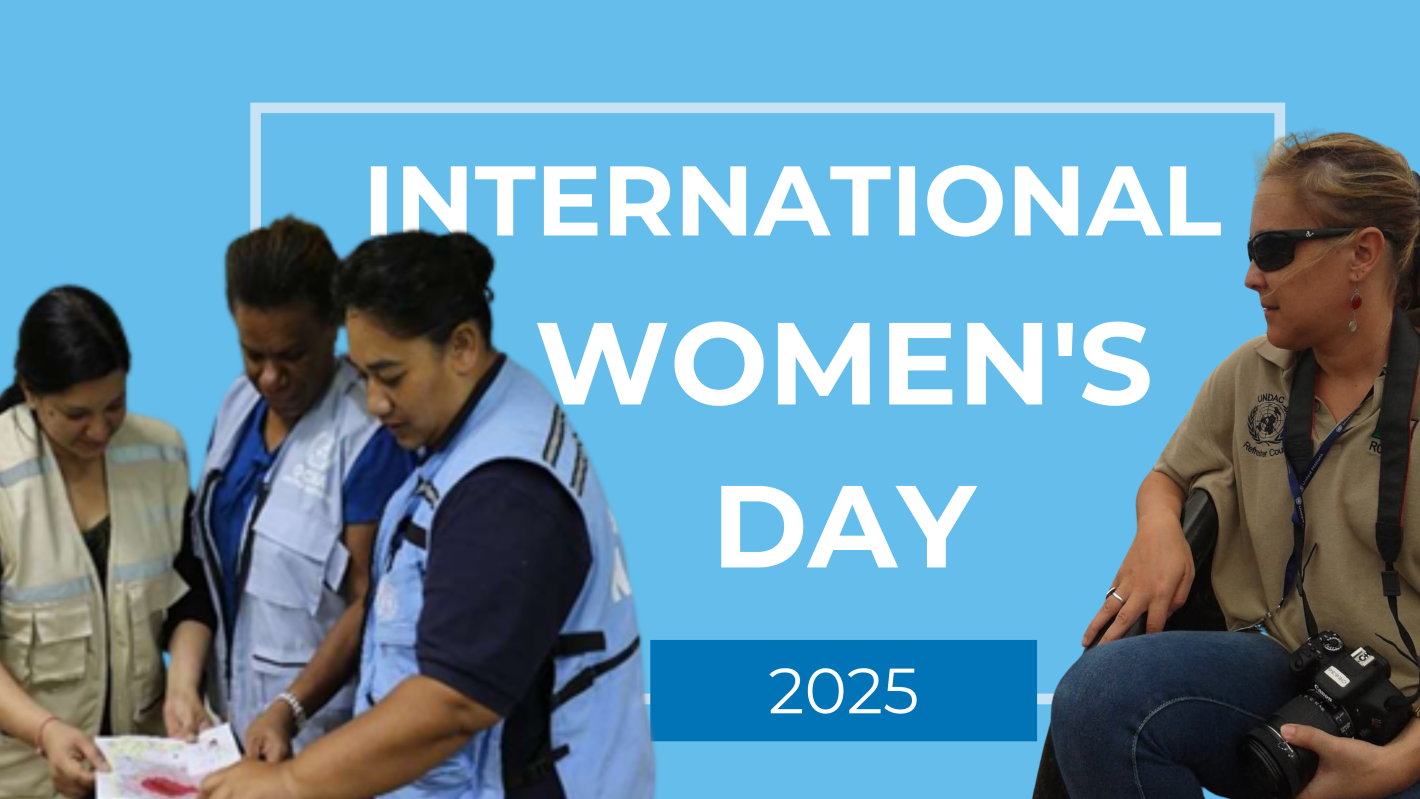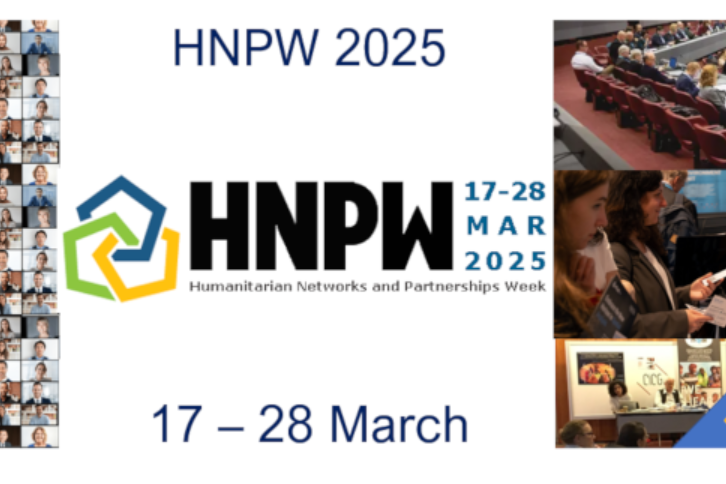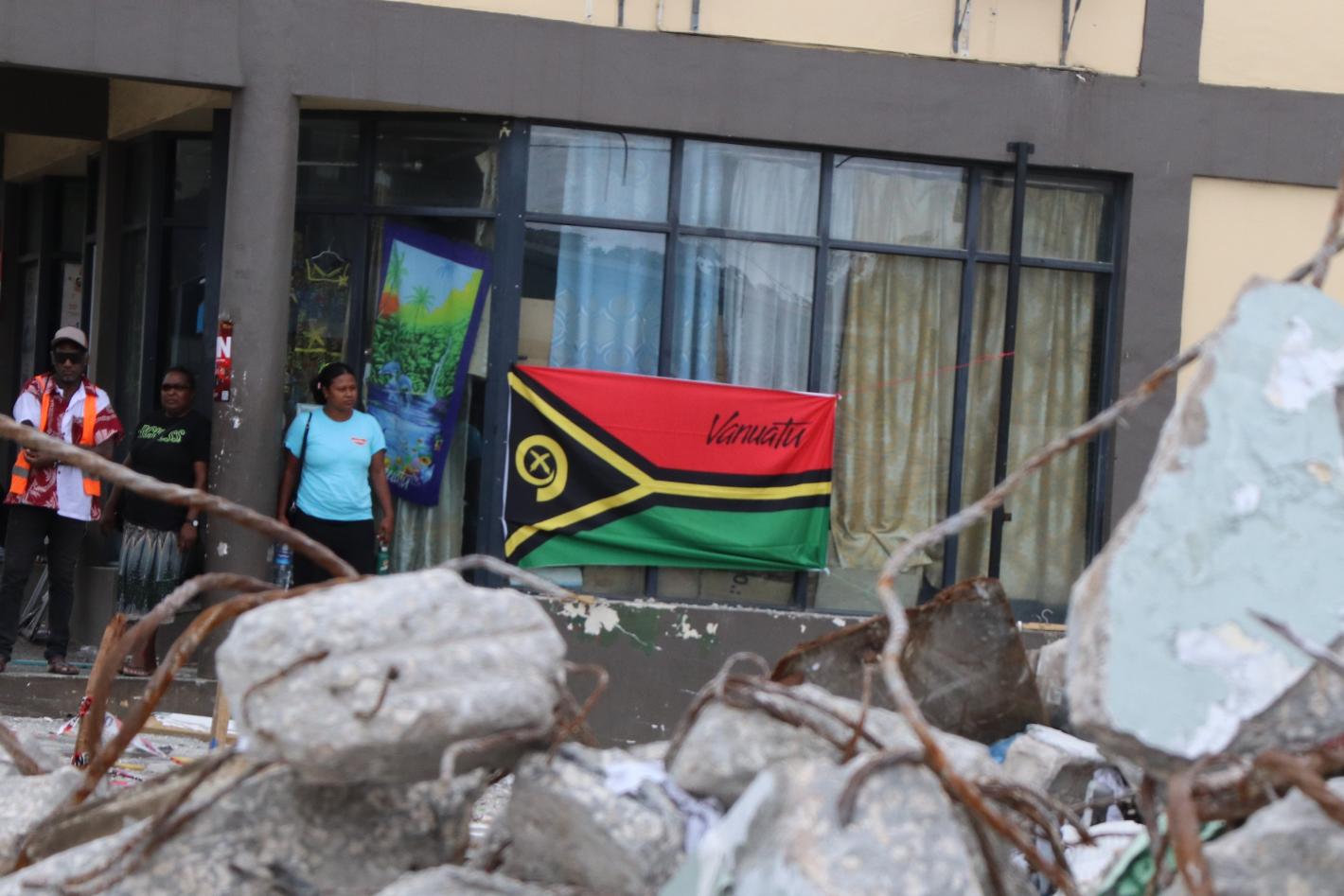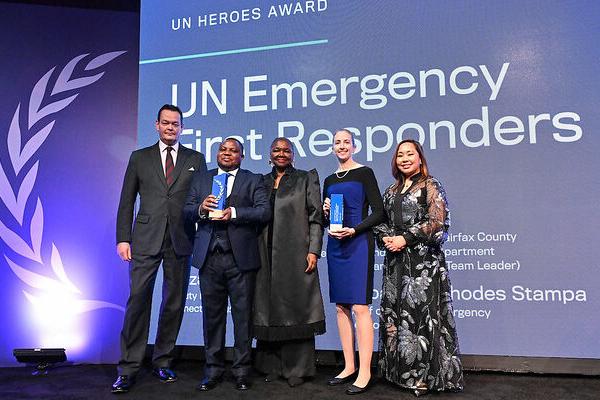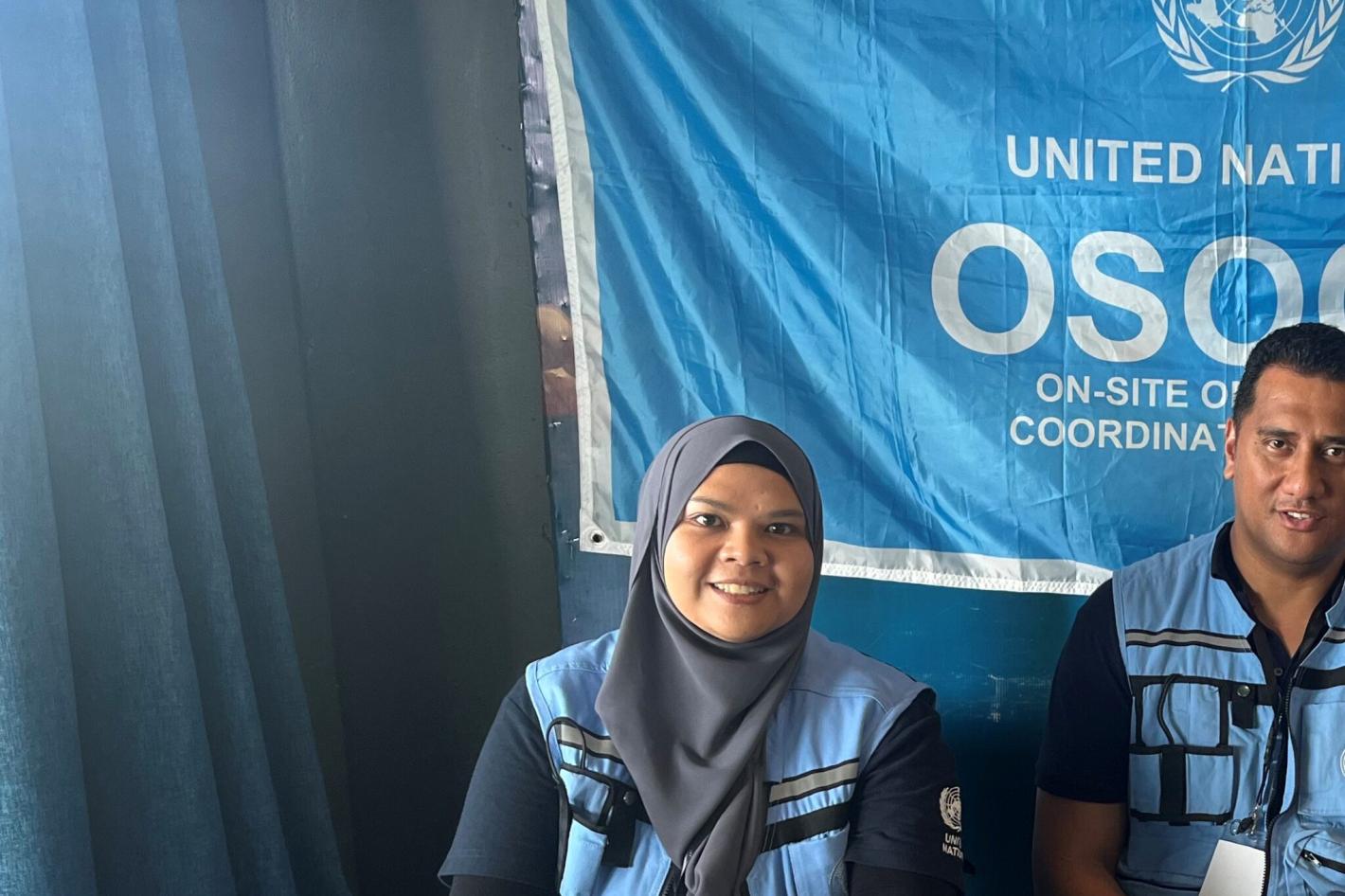This year International Women’s Day, we celebrate the dedication and resilience of women working on the frontlines of humanitarian response. As UNDAC members, Elizabeth Hosking and Natalia de Avila have played essential roles in disaster response, bringing expertise, leadership, and a commitment to supporting affected communities worldwide. Their stories highlight the invaluable contributions of women in emergency coordination and disaster relief.
Elizabeth Hosking, UNDAC member
Elizabeth Hosking has led and supported multiple UNDAC missions, including the 2018 Papua New Guinea Earthquake Response and Tropical Cyclone Winston in Fiji, where she played a key role in logistics, coordination, and liaising with local authorities. As the first female Cook Islander in UNDAC, she continues to pave the way for more women in disaster response.
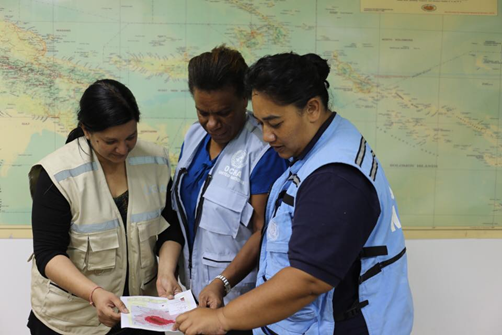
Elizabeth Hosking on the far right, 2018 with Rashmi Rita and Vini Talai/Photo:UNOCHA
To learn more about her journey and insights, we spoke with her in the following interview.
How does your background or personal experiences shape your decision to work in this field?
I entered the Disaster Management field because there were very few women in this space. My background is in training, facilitation, and instruction, and I previously qualified as an Aviation Security Instructor—becoming only the second female in the Cook Islands to attain this qualification. Since then, I have continuously strived to break new ground.
I am the first female Cook Islander to hold the position of Chief Inspector for Labour. I am also the first to become a member of UNDAC (United Nations Disaster Assessment and Coordination) and the first to complete UN Civil-Military Coordination training (UNCMCoord), twice. Additionally, I was the first to be deployed on an UNDAC mission, with four missions now in my portfolio.
One of my most memorable moments was during my third deployment to Papua New Guinea for the 2018 Earthquake Response, where the photo above taken—yet another proud milestone as a Cook Islander woman in the humanitarian field.
What inspired you to pursue opportunities with UNDAC?
I was driven by the goal of becoming the first female Cook Islander to achieve milestones that no other woman from my country had accomplished in this field. I wanted to challenge myself, explore every opportunity, and contribute in as many ways as possible.
Over the past 10 years as a UNDAC member, I have had the privilege of deploying and assisting communities in various roles. So far, I hold several firsts as the only female Cook Islander in the UNDAC system: 2 UNDUCKS, 4 deployment missions, 2 UNCMCoord Trainings, 2 Asia Pacific Earthquake Response Exercise (APERE), 3 Consolidations, 1 National Emergency Response Team (NERT) training.
Each of these experiences has strengthened my skills, resilience, and commitment to making a difference in disaster response and coordination.
What is your favorite aspect of the job?
The opportunity to meet, connect with, and assist people—whether they are new colleagues, seasoned professionals, or members of the communities we serve.
In this field, every interaction is meaningful. Engaging with colleagues from diverse backgrounds allows me to learn, share knowledge, and build strong professional networks, while working directly with communities provides a sense of purpose and fulfillment. Seeing firsthand how our efforts positively impact people's lives, whether through disaster response, labour advocacy, or capacity building, is incredibly rewarding.
At its core, my work is about helping others in meaningful ways, and that is what continues to drive my passion and commitment to this field.
What are some of the biggest challenges you face in your work?
One of the biggest challenges I have faced in this role is learning to balance my desire to help with the need to prioritize. I naturally want to take on everything and anything, but I’ve had to learn the importance of focusing on assigned tasks rather than spreading myself too thin.
As a perfectionist and a Virgo, I have a strong drive to ensure that every detail is handled correctly. However, I’ve come to understand that being effective doesn’t mean doing everything—it means doing the most important things well. This has been a valuable lesson in discipline, delegation, and trusting others to play their part in achieving our shared goals.
What was your most memorable mission?
Every mission I’ve been on has been memorable, each with its own defining moments. However, in terms of operational capability and truly making an impact, my most memorable mission was the 7.8 Earthquake Response in Papua New Guinea in 2018.
I took on multiple critical roles, including Team Admin Support, Finance, Logistics, Safety and Security, and Health and Well-being, pushing myself beyond my comfort zone. I had to prioritize team needs to ensure we operated at maximum efficiency over the three-week deployment.
What is your most unforgettable experience or moment of triumph while working in operations?
One of my most unforgettable experiences in operations was during Tropical Cyclone Winston in 2016. I was based in Lautoka with Rashmi, supporting the WestDIV Emergency Operations Centre and assisting wherever we could.
I was given the opportunity to accompany the Government and Military team on a relief distribution mission deep into the interior of Vanua Levu. As the only Pacific Islander in the UNDAC team at the time, Sebastian honored me with the responsibility of representing the United Nations in the traditional sevusevu custom—a role I accepted with immense pride.
The mission took 13 hours to complete, from the distribution yard to each outpost, into the affected villages deep in the interior, and back again. It was both a physically demanding and deeply rewarding experience, made even more significant by the fact that I became the first female Cook Islander to participate in a relief distribution mission into the interior of Fiji while upholding the sevusevu protocol. This experience remains one of my proudest moments.
Have you had any influential role models who have provided guidance along your journey?
UNDAC remains a male-dominated system, but throughout my journey, I have been fortunate to have several inspiring female role models—from my Induction in Indonesia to various trainings and missions. There are too many to name, but each has played a role in shaping my path.
In the Asia-Pacific region, I continue to be in awe of my good friend Rashmi Rita, whose resilience and expertise in the Information Management space are truly inspirational. Her dedication never ceases to impress me.
I am also grateful to Haruka Ezaki, who has been an inspiration since our Induction days. Beyond that, I deeply respect pioneers in the humanitarian field like Peter, Sebastian, and the now-retired Winston Chang, who have always been ready to guide, mentor, and inspire.
What advice do you have for women starting out in humanitarian work?
My advice is simple: just go for it. Take every opportunity to learn, grow, and challenge yourself. This field is demanding, but it is also incredibly rewarding.
Embrace every experience, no matter how big or small, because each one will teach you something valuable. Never be afraid to step outside your comfort zone—you are more capable than you realize. There will be challenges, moments of doubt, and times when the work feels overwhelming, but perseverance and resilience will carry you through.
Most importantly, never lose faith in yourself or your purpose. Keep pushing forward, stay committed to making a difference, and always believe that your contributions matter—because they do.
If you had a magic wand and could change one thing about the humanitarian sector, what would it be?
I would transform the humanitarian sector into a space that truly values diversity, efficiency, and well-being. I would ensure that more women—especially from underrepresented regions like the Pacific—are leading disaster responses and shaping global humanitarian policies. I would remove bureaucratic delays that slow down aid, creating a system where local responders are fully recognized, resourced, and empowered to drive humanitarian action in their communities. Lastly, I would make mental health and well-being a priority, because while we dedicate ourselves to helping others in crisis, we must also take care of ourselves and each other. A more inclusive, effective, and compassionate humanitarian sector is not just necessary—it’s possible.
Natalia de Avila, UNDAC member
Natalia de Avila has been an active part of UNDAC since 2008, deploying across Latin America and the Caribbean. She played a critical role in the 2017 Mexico Earthquake response, helping coordinate emergency efforts in a country with strong disaster management capacities. Her work ensures that humanitarian responses are efficient, effective, and inclusive.
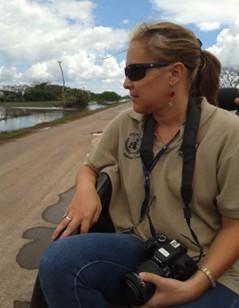
To learn more about her journey and insights, we spoke with her in the following interview.
How does your background or personal experiences shape your decision to work in this field?
Since my adolescence, I felt called to work with vulnerable communities. I studied psychology and my first years were dedicated to community work. Later, emergency situations in my country led me to further training. In 2008 I had the opportunity to apply to join the UNDAC team, and since then I have dedicated years to working in humanitarian aid, especially in Latin America and the Caribbean.
What inspired you to pursue opportunities with UNDAC and OCHA?
Working with the UNDAC team and with OCHA allows me to contribute to reducing human suffering and to think of communities that are increasingly stronger and have established capacities. In each mission, working with other humanitarians as well as with the population reminds me of the need to work towards a more just and equitable world.
What is your favorite aspect of the job?
Getting to know different realities and cultures and learning from and with them. In each mission I feel that a better world is possible.
What are some of the biggest challenges you face in your work?
In Women's Month, I would like to highlight the challenge of working in a masculinized field. Women who choose humanitarian work are committed to showing that incorporating a gender perspective into our search and rescue and humanitarian response teams is not just a matter of equity; it is a strategic imperative that can make the difference between success and failure in our missions. Together, we can build a future where everyone, regardless of gender, has the opportunity to be heard and cared for in times of crisis.
What was your most memorable mission?
Every mission has its challenges. In Nicaragua in 2009, I was taking my first steps in the humanitarian world, and we were deployed to support the coordination of the response to Hurricane Ida. In my case, I was deployed to the south, where the challenges to reach the affected communities were great in terms of access. There were many days spent traveling through isolated communities, in small boats that took us from one side to the other under the high temperatures of the Caribbean. However, the isolated communities welcomed us, with what little – if anything – they had left, and with all the hope of being able to begin the recovery process.
What is your most unforgettable experience or moment of triumph while working in operations?
Closing the mission after the 2017 Mexico earthquake. A country with strong capacities and solid coordination, to which we were integrated, bringing added value that the country thanked in an emotional closing ceremony. It was incredible to feel that the work of more than 15 days was reflected in a more effective and efficient response to the affected population.
Have you had any influential role models who have provided guidance along your journey?
On my first mission, the focal point for the Americas was a woman. Seeing and knowing that other women had been walking these paths for years was encouraging. Today, I invite more women to join in, to make a difference, to know that it is possible to reconcile family life and humanitarian aid, and that we have much to contribute by bringing a perspective that allows us to guarantee an equal response and attention.
What advice do you have for women starting out in humanitarian work?
Your work makes a difference. At times the road can be hard, so it is important to have a support network that understands your work and above all values and works as a team with other women who are on your path.
If you had a magic wand and could change one thing about the humanitarian sector, what would it be?
Having more resources to ensure relief to human suffering, to save more lives, to generate permanent changes in the affected communities.
We extend our heartfelt gratitude to Elizabeth, Natalia, and all the women working tirelessly in humanitarian response. In a field where women remain underrepresented, their work is a testament to the importance of inclusive leadership in humanitarian action. Their expertise, resilience, and commitment are shaping a stronger and more effective disaster response system. Let’s continue working towards a humanitarian sector where women’s leadership is not the exception, but the norm.

